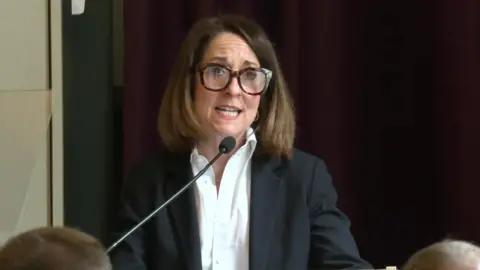In a recent address, Liz Kendall, the Work and Pensions Secretary, firmly stated that she would not retreat from making tough welfare decisions, despite acknowledging that such changes are often met with dissatisfaction, particularly for Labour governments. This statement underscores her commitment to reforming the welfare system, which she claims is critical for its sustainability moving forward.
Kendall made her remarks while speaking in central London, emphasizing the necessity of reforming welfare to ensure it remains viable for future generations. She pointed out that without necessary changes, there is a risk that the welfare system might fail to support those who genuinely need assistance in the future. This comment reflects a broader sentiment within the government regarding the urgency of reforming welfare provisions amid increasing demands on the system.
However, the proposed measures have stirred unease among several Labour MPs. Neil Duncan-Jordan, the MP for Poole, expressed his profound concerns regarding the government’s accelerated pace in implementing cuts to benefits, labeling it an aggressive approach. He urged the government to reconsider these cuts and suggested a pause until a thorough and healthy debate can take place within the Labour Party about alternative avenues for funding, rather than resorting to cuts in benefits.
This internal debate within the Labour Party is accentuated by a memo reported by the Daily Telegraph, which revealed that Deputy Prime Minister Angela Rayner’s office had advised the Treasury to explore new tax-raising measures earlier this year. Chancellor Rachel Reeves has stressed a commitment not to borrow funds for day-to-day operations, further complicating discussions regarding welfare funding.
In March, it was announced that £5 billion would be sliced from the welfare budget, a decision that Kendall defended during an event at the Institute of Public Policy Research. She articulated that the existing welfare system had failed to keep pace with increasing life expectancy and the growing number of individuals living with disabilities or long-term health conditions. Moreover, she noted that the number of recipients of Personal Independence Payments is expected to soar to 4.3 million, raising sustainability concerns.
Kendall argued that the current trajectory of welfare spending is neither sustainable nor equitable for those requiring support, nor for taxpayers. She insisted that reforms are needed to empower those capable of working while ensuring that resources are efficiently allocated to those in need. Acknowledging the unpopularity of welfare reforms, Kendall expressed her intention to listen to public concerns, reaffirming that Labour’s responsibility lies with making tough choices for the betterment of the electorate they serve.
Yet, this stance has faced pushback from organisations such as Citizens Advice, which labeled the government’s approach as shortsighted and potentially harmful, asserting that cutting vital support could drive many deeper into poverty. Dame Clare Moriarty, chief executive of the organization, emphasized that such cuts create desperation rather than opportunities.
Moreover, criticisms have arisen regarding the government’s decision to limit the eligibility of pensioners for winter fuel payments, which further reflects the contentious nature of current welfare reforms. In a responsive move, Prime Minister Sir Keir Starmer announced a partial reversal of these cuts, allowing a broader segment of older individuals to qualify for this essential support.
In summary, Liz Kendall’s unequivocal stance on welfare reform marks a significant moment in the Labour government’s journey. While addressing the pressing need for change in the welfare system, her comments have ignited debates within her party and attracted criticism from charitable organizations, emphasizing the complex and often contentious nature of welfare-related policies. The path forward remains fraught with challenges as the government seeks to balance fiscal responsibility with the necessity of providing adequate support to the most vulnerable citizens.



